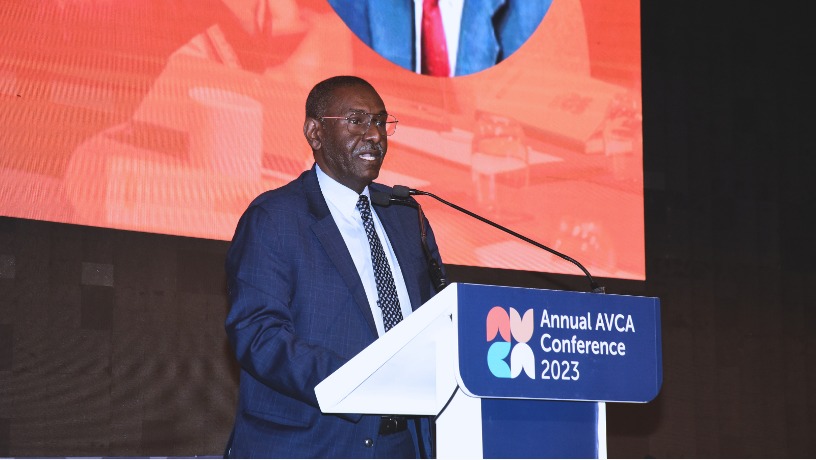AVCA’s THIRD VENTURE CAPITAL SUMMIT CALLS FOR TECH-ENABLED GROWTH
Font size
Following the African Private Capital Association’s (AVCA) successful 19th Annual Conference, held from Tuesday 2 – Thursday 4 May, the industry association delivered its third Venture Capital (VC) Summit, held between Wednesday 3 and Thursday 4 May 2023. The summit convened over 400 private capital allocators, entrepreneurs and innovators to discuss new trends and strategies to navigate uncertainty and maintain sustainable growth of VC activity in Africa.
Abi Mustapha-Maduakor, CEO, AVCA, opened the summit with a welcome address where she described how other African governments could learn from the interventions Egypt, the summit’s host, has made to revitalise growth and engage local and international investment. She said, “Egypt has a vibrant entrepreneurial ecosystem made possible by targeted government initiatives to create an enabling environment, making it one of the leading VC hubs on the continent.”
Following the sentiments of AVCA’s CEO, Nadir Mohammed, Regional Director, Equitable Growth, Finance & Institutions (EFI), Middle East & North Africa Region, World Bank Group, proceeded by unpacking the enabling role the Egyptian Micro, Small, and Medium-sized Enterprise Development Association (MSMEDA) plays in catalysing growth across the country. MSMEDA co-hosts AVCA’s VC Summit and is a key partner to the World Bank – achieving its agenda in driving equitable wealth creation.
Outlining the importance of establishing shared progress, Nadir Mohammed said, “Our priorities of poverty reduction and shared prosperity aligns with AVCA’s mandate to encourage private investment in sectors driving this change. Without which, we cannot navigate a challenging global environment or meaningfully achieve our objective to boost private sector-led development.”
The inaugural panel session, On the Rise – Venture Capital and Early-stage investing in Africa Catapulting, discussed the maturation of Africa’s entrepreneurial space. Panellists, including Brian Waswani Odhiambo, Partner, Novastar Ventures, discussed the proponents of the ecosystem’s exponential growth, the rise of venture funding and the role of managers in supporting the entrepreneurial ecosystem in Africa.
Fellow panellist Maurizio Caio, Founder and Managing Partner TLcom Capital, explained that Africa’s robust performance last year amidst a weakened global VC landscape was thanks to “its focus on building real economy solutions, addressing deficits of critical services within payment systems and health provision.” Panellists traded views on the wider participation of funding partners as a key characteristic of this, citing DFIs moving upstream in the investment lifecycle and international finance plugging the gap in late-stage funding.
Idris Bello, Managing Partner, LoftyInc Capital Management, prompted the audience to consider the importance of always having African investors at the table, “whose commitment is unwavering and essential to safeguarding progress through more difficult times.”
Plenary sessions shifted to fintech, the dominant sector within VC. Prominent voices in the industry, including Khaled Ben Jilani, Senior Partner, AfricInvest, applauded the sector’s dynamism and expanded on areas where the industry could innovate further. He recounted that 95% of transactions across the continent are still made in cash. Khaled Ben Jilani said, “There is an enormous opportunity for growth in the primary financial digital market and even more so in areas it enables, from insurtech to B2B payments, and furthering progress within embedded finance.”
Mohamed Okasha, Founder & Managing Partner, DisrupTech described how Africa’s next wave of fintech will grow faster than the last – supported by the breadth and depth of existing infrastructure already in place. The panellists collectively agreed that this would generate onward growth and success in the form of local IPOs, and home-grown internationally-facing businesses.
As proceedings split into multiple streams, in one session, Trailblazing Beyond Fintech, GPs highlighted the range of market efficiencies technology moves in logistics, agriculture and energy sectors – supporting more streamlined second-generation services that are primed for growth. Marcus Watson, Partner, KawiSafi Ventures and Sandrine Henton, Managing Director, EG Capital, promoted an all-encompassing approach to building tech-enabled climate resilience. Matthieu Cucorroy, Head of the Private Equity Unit, European Investment Bank, underscored the potential for replicability in the sector and the collaboration it creates between investors from developing markets to those with a favourable track record.
Other sessions examined topical areas such as climate technologies for adaptation and mitigation, the rising interest in venture debt, and strengthening corporate governance to affect growth in start-up ecosystems across the continent.
In a session that recapped the role of angels, accelerators, incubators and fund managers in sourcing start-ups and accelerating their growth from idea to IPO, Oyin Solebo, MD, ARM Labs Lagos Techstars Accelerator, raised that too many female founders and entrepreneurs with potential were “deselecting themselves, in comparison to men”, who frequently feature in accelerators, and more confidently put themselves forward as entrepreneurs.
In the closing panel, Straight From The Source: LP Perspectives on Venture Capital in Africa, Najada Kumbili, Head, Investments, Visa Foundation; Simone Baur, Director, Impact Investments, Allianz Global Investors and Sherine Shohdy, Head of Office and Coverage Director, Egypt, British International Investment explored the views, preferences and expectations of both commercial and development-focused capital allocators on the future of venture capital in Africa.
Simone Baur said that the climate is becoming more competitive, and raising capital is a challenge. She suggested that development finance institutions and blended finance structures could direct public money to first-time players overlooked. She continued saying, “More money has been coming to Africa, and it is not enough, and what private and institutional players are prioritising is not clear.” Expressing that VC investors need to extend tenors beyond the typical 5-year cycle of private equity horizons, Sherine Shody said, that: “It is our role to invest patiently, continue to take on more risk, and mobilise other types of investors – they have a part to play.”
Concluding on the pervasiveness of tech, Sherine Shody urged the VC ecosystem to embrace the impact new technologies can have across many sectors as technological innovations such as AI are no longer an imagination but a part of our reality.













